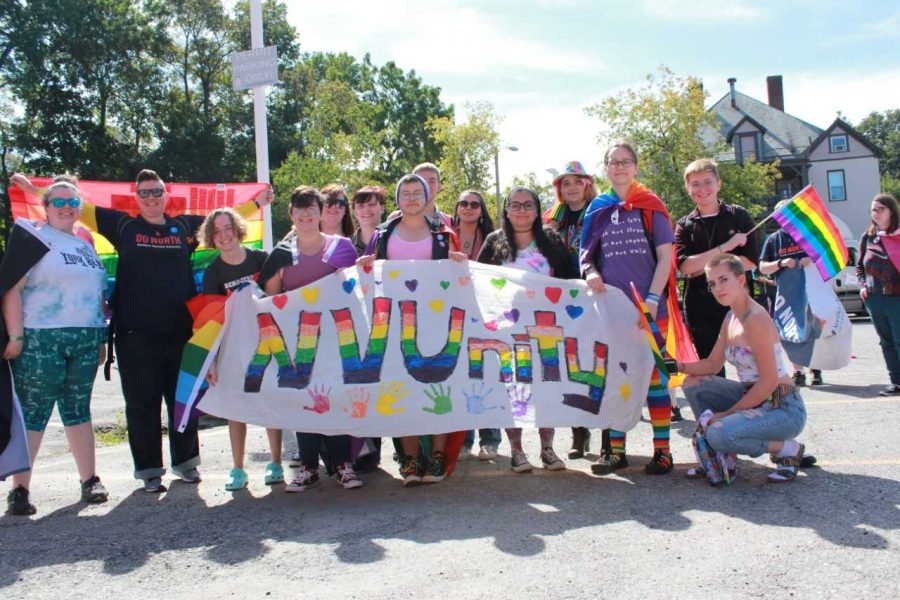NVU marches in Gay Pride parade
NVUnity in Burlington
The morning of Sept. 8 begun with a typical Vermont chill, the air pleasant though biting and buzzing with unbridled excitement.
College students, children, and adults alike stood with voices filled with vibrancy, like the rainbowss donning their cheeks, their backs, their hands, their clothes. This was, after all, Burlington’s LGBTQ+ pride parade.
Many attribute the beginning of the gay rights movement (and other LGBTQ+ rights) to the Stonewall Riots on Jun. 28, 1969, prompted by a particularly nasty police raid on the Stonewall Inn, a predominantly gay bar in Greenwich Village, New York.
Jun. 28 of the following year marked the first ever pride marches in New York, San Francisco, and Los Angeles.
In every year following, local LGBTQ+ communities will organize Pride marches, most often in June to commemorate the Stonewall riots.
Since then, the LGBTQ+ community globally has made tremendous strides towards equality. On Jun. 26, 2015, the United States Supreme Court overruled the ban on same-sex marriage in all 50 states. Even more recently, The Supreme Court of India decriminalized sexual activity between same-sex couples on Sept. 6, 2018.
For most people, Pride is a place of acceptance and a time to find a place among like-minded people. For Lisa Zinn, a part-time professor at Northern Vermont University and a member of the Vermont LGBTQ+ community, Pride is more than just a parade.
“Pride historically has been very important as a place for LGBTQ+ people to make themselves visible… to let people know that it’s not something that’s rare, that there’s lots of us out there,” she says. “We’re important. We’re important in voting, we’re important as a part of society….It’s also a safe place for people to come together who often feel like they don’t fit in the world quite as well as the rest of us, so it’s a really nice time, to be able to come together and have a space that feels safe,”
For others, it’s about showing support to otherwise marginalized groups. Many people, regardless of their orientation, attend these events to show their love and support.
Whether they were marching or lining the streets, that positivity was very much evident on that fine June day. “Pride is important to me because I’m from a very diverse family and we know many people that have been given a hard time,” said Annabelle Hipp, a Northern Vermont University student. “We live by the idea that love conquers all and that is the most important.”
As the march progressed, a handful of people joined the procession towards Lakeside Park. People reached out hands, their voices lifting with the brightly colored flags. Though this was a day of celebration, to recognize the achievements the LGBTQ+ community has made, some clearly felt there is more work to be done.
Eric Welarz, a former student at Lyndon State College, said that he would like to move forward with more aid available in the work environment and healthcare. “… I want us to get to a point where we don’t have to worry about that [health care],” he says. “I think that’s the biggest thing.”
A little closer to home, there is the Northern Vermont University club NVUnity, which dedicates its time to provide a safe and welcoming environment for students who feel that they may not fit in elsewhere. Kelsey LaCasse, NVUnity’s event coordinator, is proud of the atmosphere that the club creates and seemed to be very excited about this year’s local pride event.
“I identify as asexual and a lot of the people in the community don’t really understand it,” LaCasse says. “Even with my gender identity, I don’t know where that is but I knew that in that place, I would feel welcomed no matter I identify as… It’s a really welcoming community, no matter who you identify as, who you’re attracted to. It was kind of an empowering thing to be a part of.”
Besides the name change, there are a few structural changes to the club this year. Contrary to previous years, NVUnity has decided to not ask for gender identities from its participating students.
“We don’t try to pry,” she explains. “Last year they asked what your identity was, your sexual orientation. We didn’t do that this year and I think that made people a little more comfortable with it. I know some people aren’t open, aren’t comfortable with their identity yet and they don’t want to feel pressured to reveal anything to anybody… People might feel a little uncomfortable admitting what they are when they haven’t even said it to themselves yet.”
Mackenzie Murdoch, the club’s vice president, states that she would like to further the club’s involvement with the local LGBTQ+ organizations, such as the Burlington Pride Center, though some members already volunteer with a local youth group every two weeks. In the future, she hopes that people will recognize the club as a safe space and as a resource on campus.
“You don’t have to be LGBTQ to be in the club,” she says. “It’s something that I don’t think that everyone knows. Knowing that you’re an ally, or however you fall, as long as you’re supportive and want to be involved in some way, then it’s open to everyone.”




